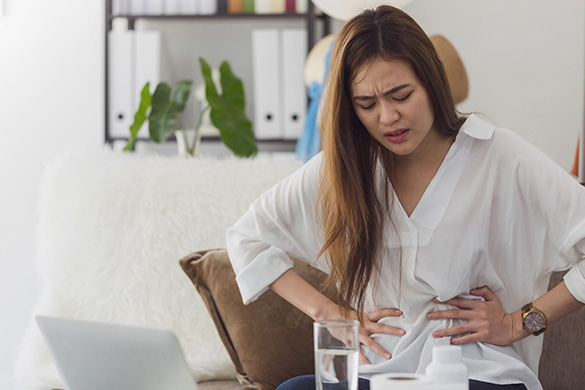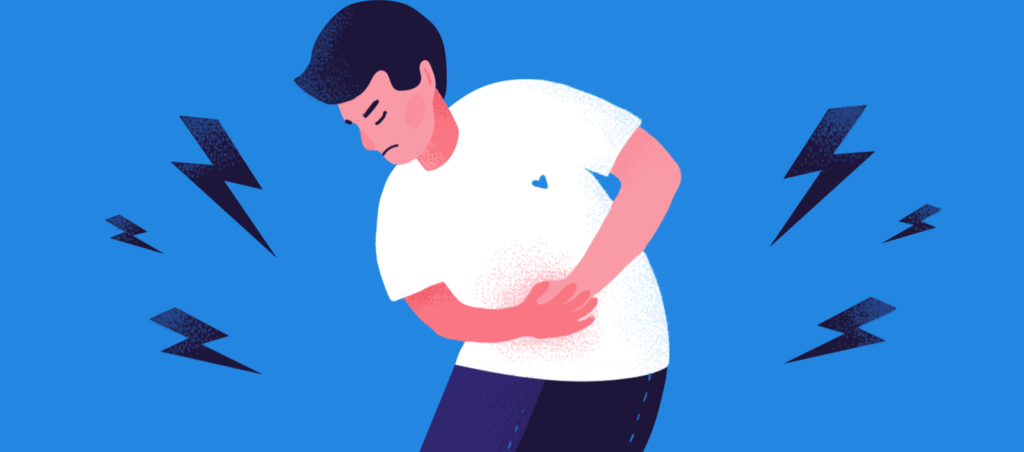If you’re like most people, you’ve probably experienced anxiety in one form or another. It can be a challenging feeling, but it’s also vitally important for our overall well-being. Unfortunately, anxiety can also lead to stomach problems – specifically, anxiety and stomach pain. What is anxiety stomach pain, and what are the causes? In this article, we’ll explore all of the basics behind this symptom, as well as some possible treatments. Read on to learn more.
Contents
What is Anxiety?

Anxiety is a mental disorder characterized by intense fear, worry, and suspense. It can lead to problems with sleeping, eating, and concentrating. Anxiety can also cause physical symptoms like stomach pain.
Anxiety is a mental disorder characterized by feelings of apprehension and tension, as well as fear and anxiety. The cause of anxiety is unknown, but many factors can contribute to its development. One of the most common causes of anxiety is stress.
What is Anxiety or Stomach Pain?
Anxiety stomach pain is a type of abdominal pain that is often associated with anxiety disorders. This type of abdominal pain typically occurs in people who have an elevated level of anxiety. It may also occur when people are under a lot of pressure or stress.
The pain associated with anxiety and this pain can vary in intensity and may persist for hours or even days. It is typically located in the abdomen, but it may also be felt in other parts of the body.
The most common symptom of anxiety and this pain is abdominal discomfort or pain. However, it may also include:
How Can You Treat Anxiety Stomach Pain?

There are many ways to treat anxiety and its associated symptoms, including medication and therapies. But one of the simplest and most effective treatments is relaxation techniques. One such technique is anxiety and stomach pain relief.
Anxiety stomach pain can be a symptom of anxiety itself or it can be a side effect of some medications used to treat anxiety. In either case, treating the underlying cause of the pain can help relieve it. Here are some tips for treating anxiety and stomach pain:
1. Relaxation techniques are one of the most effective ways to treat anxiety and this pain. The key is to find something that works for you and that you can stick to. Some examples include meditation, yoga, progressive muscle relaxation, and breathing exercises.
2. If relaxation techniques aren’t helping, try medication depending on your specific symptoms. There are several medications available that can help reduce anxiety and its associated symptoms, such as antianxiety drugs or antidepressants. Talk with your doctor about which option is best for you.
3. If medication isn’t an option or if it’s not working well enough, consider complementary therapies such as acupuncture or massage therapy. These treatments may help improve overall health and reduce inflammation, which can contribute to anxiety symptoms.
4. Try dietary changes if you’re struggling with anxiety and stomach pain. Some foods that have been linked to stomach pain, such as caffeine, alcohol, and high-fat foods, may worsen symptoms in those with anxiety. Switching to a diet that is low in these types of foods may help reduce anxiety and stomach pain.
5. Give yourself time to heal. It can take a while for symptoms of anxiety and this pain to improve. Be patient and keep working on relaxation techniques, medication, and other complementary therapies until you see a noticeable change.
6. Have patience and don’t give up. Many people experience a slow but steady improvement in symptoms with treatment. If you’re struggling, talk to your doctor or therapist about what options are available to you.
7. Makesure to keep your stress levels in check. Stressed-out individuals are more likely to experience anxiety and stomach pain. Try to find ways to relax and destress, such as doing yoga or meditation, reading, or spending time with friends and family.
If you’re experiencing anxiety and stomach pain, it’s important to talk to your doctor. There are many potential treatments available, and finding the right one for you will help improve your overall health and well-being.
Reasons For Anxiety Stomach Pain

Anxiety and stomach pain can be very frustrating experiences. It can make everyday tasks difficult, such as eating or drinking. It can also lead to other medical problems, such as headaches or heartburn. There are many reasons why someone might experience anxiety and this pain, and understanding the cause is key to solving the problem.
Some of these reasons can also be associated with other mental health problems, such as stress or anxiety. If you are experiencing anxiety and this pain, it is important to talk to your doctor about the root cause. They may be able to provide you with advice on how to treat the problem.
Some of the possibilities for anxiety and stomach pain include:
One of the main causes of stomach pain is discomfort from anxiety or stress. When these feelings are chronic, they can cause physical symptoms, such as anxiety and stomach pain. Inflammation: Another possible cause of anxiety and stomach pain is inflammation. This can be caused by a variety of factors, including food allergies or sensitivities, environmental pollutants, and even certain medical conditions.
Another possible cause of anxiety and stomach pain is inflammation. This can be caused by a variety of factors, including food allergies or sensitivities, environmental pollutants, and even certain medical conditions. Digestion problems: One of the ways that anxiety can affect digestion is by causing constipation or diarrhea. These problems can lead to abdominal pain and cramps.
One of the ways that anxiety can affect digestion is by causing constipation or diarrhea. These problems can lead to abdominal pain and cramps. Pain from other health conditions: If you have other health problems, such as GERD (gastroesophageal reflux disease) or asthma, your body may react to the anxiety by experiencing stomach pain.
If you have other health problems, such as GERD (gastroesophageal reflux disease) or asthma, your body may react to the anxiety by experiencing this pain. Food allergies: If you are allergic to certain foods, they may cause physical symptoms, such as stomach pain.
Can Anxiety Stomach Pain Be Prevented?

The answer to this question is a resounding yes. There are several things that you can do to help prevent anxiety and stomach pain, including taking proper steps to manage your anxiety, eating a balanced diet, and getting enough exercise. However, if you do experience anxiety or stomach pain, it is important to seek medical attention as soon as possible. Although the cause of this symptom is often unknown, a doctor can help diagnose and treat the problem.
Some of these ways to manage anxiety and stomach pain are:
Try relaxation techniques, such as yoga or meditation
One of the most common relaxation techniques is mindfulness meditation. This involves focusing on your thoughts and sensations, but without judgment. Teaching yourself how to relax this way can be very helpful in managing anxiety and stomach pain.
Talk to a therapist
Talking to a therapist can provide you with support and guidance as you try to manage your anxiety. A therapist can also help you develop coping mechanisms for when anxiety symptoms flare up.
Learn about your triggers
Some things that may trigger anxiety in some people are foods, smells, sounds, or physical sensations. Learning about the things that are causing your anxiety can help you identify and avoid these triggers.
Take medication if necessary
If medication is necessary to manage your anxiety, be sure to discuss this with your doctor. Many medications available today are known to be effective in treating anxiety, including antidepressants and antianxiety medications.
Avoid caffeine and alcohol.
Another common way that anxiety can be expressed is through overeating or drinking alcohol or caffeine. Both of these substances can increase anxiety levels in people and may lead to overeating or drinking to relieve that anxiety.
Increase your level of physical activity
Physical activity has been shown to have several health benefits, including reducing anxiety symptoms. Exercise can help to increase your mood, reduce stress, and improve your sleep quality.
Get enough sleep.
Talk to your doctor about any medication that you are taking. Sleep may be helped by some of these medications. Additionally, getting enough sleep can help to reduce anxiety symptoms in the long term.
Conclusion
If you’re experiencing anxiety, stomach pain, or both, it’s important to seek out help. These are powerful signs that something is wrong and needs to be addressed. Several things can cause these symptoms, so don’t hesitate to get in touch with your doctor for an assessment. In the meantime, here are some tips on how to manage anxiety and stomach pain together.
Hope this article was of help to you! If you are suffering from mental health disorders, you may seek help from Therapy Mantra. We have a team of highly trained and experienced therapists who can provide you with the tools and skills necessary for overcoming mental health disorders. Contact us today to schedule an online therapy or download our free Android or iOS app for more information.


